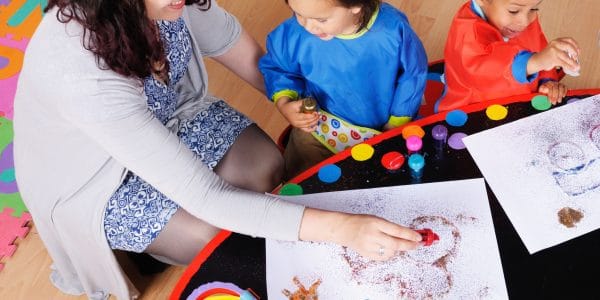
17/06/20
3 min read
As the hard-hit early years education and childcare sector begins to emerge from the initial phase of the COVID-19 crisis, Professor Eva Lloyd from the University of East London outlines why now is the time to prioritise equitable access to early years provision.
The COVID-19 crisis has highlighted the fault lines within the early years and childcare sector. In the early stages of lockdown, the government’s economic support packages seemed to imply that the early years education and childcare sector’s needs were like those of nursery and primary schools, and childminding was ignored altogether. More needs to be done to sustain the sector and to make it more equitable.
The early years and childcare sector faces a grim outlook. The COVID-19 crisis accelerated a scenario that was likely to develop anyway, given the sector’s lack of resilience. Its impact threatens the sector’s survival and hence the UK’s economic recovery. Recent sector organisation surveys, a Local Government Association statement, and a TUC report confirm these risks.
In the light of current child poverty levels and the likely increases in parental unemployment after lockdown, equitable access to early years and childcare provision is also an urgent issue. Nursery schools and classes will not be able to fill the gap in early years and childcare provision for growing numbers of children in poverty, of whom 70% have at least one employed parent.
Across the UK most early years and childcare provision for children aged between 0 and 4 is delivered by the private childcare sector. In England, for instance, only 35% of 3-year-olds and 14% of eligible 2-year-olds received their funded early education in state nursery classes or nursery schools, while 78% of 4-year-olds received this in primary reception classes.
In 2019, only 7% of places in the UK childcare market was delivered by private-nor-for-profit outfits like charities or social enterprises, while large chains deliver 53%. This UK private childcare market is viewed commercially as offering excellent investment opportunities where serious profits can be made. As a result it is seeing increasing consolidation, which means that larger chains are pursuing ambitious expansion strategies through mergers and acquisitions, financed by private equity companies, venture capital funds and banks. This market is now international, with 13% accounted for by inward investment from international childcare companies and UK chains expanding abroad. This makes the UK childcare market part of an emerging global market.
National and international research evidences how childcare market operations generate socially stratified early years and childcare provision, where high quality, accessible and affordable services are increasingly out of reach for low- and middle-income families.
On top of this, English early years and childcare policy itself works against equitable access as it gives rise to:
- An incentive for private-for-profit childcare businesses to deny access to families seeking only funded early education for their children, through the charging of top-up fees for these universal and extended hours, making provision unaffordable for low-income families.
- A requirement for upfront childcare fee payments from parents seeking childcare over and above the funded early education for 2-, 3- and 4-year-olds and for younger children, including from those qualifying for Tax-free Childcare and from Universal Credit claimants. Parliamentarians called this a ‘fundamental’ policy flaw.
- A continuing steep rise in childcare fees for those extra hours, above the current rate of inflation.
Accountability is also important. The Nuffield Foundation has funded a forthcoming study of the English private childcare market, which uses publicly available information to explore childcare business finance, location, continuity, transparency, accountability and governance. This study includes a forensic accounting analysis of some large and medium-size private childcare chains and their subsidiaries.
Accountancy research has also drawn attention both to the need for a more ethical accounting and finance profession) and to the way in which current international accounting regulations obscure actual business performance and profitability, with balance sheets now including speculative assumptions about a firm’s assets.. In contrast to the UK private-for-profit childcare sector, the not-for-profit sector’s Charity Commission accounts are more transparent.
Rebuilding the early years and childcare sector through the pandemic and beyond requires radical long-term strategies that address its systemic weakness. Three strategies, tried and tested in other OECD member states, need urgent consideration:
- The immediate creation of a rescue and recovery fund to support the sector and its infrastructure. Funding needs to go to providers direct. Offering a more generously funded 30 hours of early education to all 2, 3- and 4-year-old children may be one temporary measure aimed at achieving an improved childcare market model.
- The provision of additional regulation to ensure that providers receiving this public funding work within a set timescale towards meeting criteria making access fair, affordable and high quality and creating workforce conditions reflecting the true value of this profession.
- A strengthened role for local government, giving it greater powers of oversight, coupled with additional funding to help make the market accessible to children with Special Educational Needs and Disabilities and to promote quality.
Additional strategies will be needed to realise an equitable and sustainable early years education and childcare system. For now, implementing these three strategies could be the first step towards generating some positive outcomes for the UK early years education and childcare sector as it emerges from the COVID-19 crisis.
About the author
Eva Lloyd OBE is professor of Early Childhood in the School of Education and Communities at the University of East London. She is also director of its International Centre for the Study of the Mixed Economy of Childcare – ICMEC – which she co-founded in 2007 with professor Helen Penn.







































